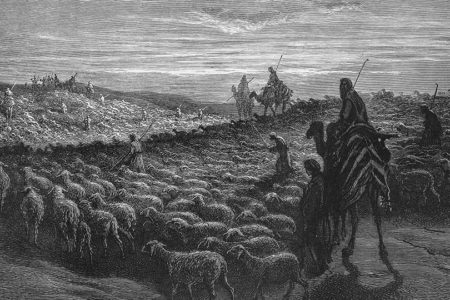The Dispensation of Promise
The fourth dispensation, the dispensation of promise, extended from God’s call of Abraham to the giving of the Mosaic Law at Mount Sinai. The Scripture portion that covers this dispensation is Genesis 12 through Exodus 18.
Since man had failed to obey God on the basis of human conscience, the restraint by the Holy Spirit, and human government, God started a fourth dispensation by instituting promise as a new ruling factor. The fact that promise began as a significant factor with God’s special dealings with Abraham is made evident by such passages as Galatians 3:15–22 and Hebrews 6:13–15.
A principle is a ruling factor if it makes a difference in the way people live. God intended His promises to Abraham and his descendants to make a difference in the way they would live. Hebrews 11:8–30 demonstrates the fact that God’s promises did make such a difference in the lives of Abraham and his descendants. Thus promise functioned as a ruling factor.
This dispensation had four ruling factors that God used to govern Abraham and his descendants: human conscience, the restraint by the Holy Spirit, human government, plus divine promise. Dispensational theologians named the fourth dispensation after the new ruling factor, since that is the factor that distinguished it from the third dispensation of human government.
The special revelation that God gave to Abraham and his descendants for the fourth dispensation is recorded in Genesis 12:2–3; 13:14–17; 15; 17:1–22; and 22:16–18. God made personal promises to Abraham: He would bless him, make his name great, give him many physical descendants, make him the father of a multitude of nations, give him the land of Canaan for an everlasting possession, and bless those who blessed him and curse those who cursed him.
God made national promises concerning Israel: He would bring Israel into existence as a nation and make it great, give Israel the land of Canaan forever, and establish the Abrahamic Covenant with the nation as an everlasting covenant.
God also made a universal promise: He would give blessing to all families of the earth through Abraham’s line of descent (the Redeemer would come through Israel).
The responsibility of Abraham and his descendants during the fourth dispensation was to obey God on the basis of human conscience, the restraint by the Holy Spirit, human government, and promise. This responsibility subjected Abraham and his descendants to the following test: Would they obey God on the basis of these four ruling factors?
Abraham and his descendants failed the test of the fourth dispensation. On several occasions they disobeyed God as the result of lapses of faith concerning the fulfillment of His promises. Abraham fathered Ishmael through Hagar. Twice he lied concerning his wife, Sarah. Isaac lied concerning Rebekah. Jacob was a great deceiver. The Jews did not return from Egypt to Canaan after the famine of Joseph’s time ended. Apparently they forgot that their destiny was related to the land of Canaan rather than Egypt.
NOTE: This article was excerpted from Renald E. Showers’ book There Really Is a Difference: A Comparison of Covenant and Dispensational Theology, published by The Friends of Israel. It is available in our online store, or you may order it by calling us at 800-345-8461.








Please provide the scriptural references to “the restraint of the Holy Spirit” in reference to Genesis 12. I’ve looked high and low for the “Holy Spirit” in those passages and cannot locate any mention of it. It’s rather confusing using it as the four restraints when one does not exist.